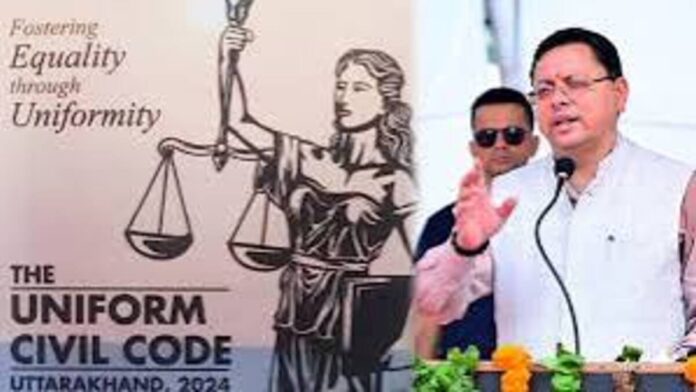Uttarakhand will be implementing the Uniform Civil Code on Monday, making it the first state in independent India to put into effect such a law. Pushkar Singh Dhami, the chief minister of the state, claims that the government has finished all the necessary preparations to put the law into effect, including obtaining permission for the rules governing its implementation and training the relevant staff. The law’s justification is that it will “ensure equal rights and responsibilities for all citizens and bring about uniformity in the society.”
“UCC is just an offering made by our state in the great ‘yagya’ being performed by the Prime Minister to make the country a developed, organised, harmonious and self-reliant nation,” news agency quoted Dhami as saying in a statement. In the lead-up to the 2022 assembly elections, the BJP has pledged to enact the Uniform Civil Code in Uttarakhand. According to these surveys, the party swept to victory for a second consecutive term, something no other party in the state has accomplished since its founding in 2000.
CM Dhami stated that the party’s dedication to passing the UCC was the reason for the unprecedented mandate. After winning the assembly elections, the Uttarakhand state cabinet approved a plan in March 2022 to establish an expert panel on the Uniform Civil Code. On May 27, 2022, the team was established to draft the UCC, with retired Supreme Court Judge Ranjana Prakash Desai serving as its head.
After one and a half years of consultation with various segments of the state’s populace, the Desai committee produced a thorough draft in four volumes. The Uttarakhand assembly passed the UCC bill a few days after it was sent to the state on February 2, 2024. President Droupadi Murmu gave it her assent in March 2024, nearly two years after the initial proposal.
After that, another expert group led by Shatrughna Singh, the former chief secretary, was working. It was established to establish the guidelines for carrying out the Act. Late last year, the Sinha committee delivered its report to the state government. Recently, the state cabinet approved it and gave the chief minister the authority to choose when it would be put into effect. Dhami chose January 27, 2025, as the date, one day after the nation’s 76th Republic Day celebration.
The rules pertaining to succession, marriage and divorce, cohabitation, and other similar topics shall be governed and regulated by the Uttarakhand UCC Act. Polygamy and ‘halala’ are prohibited, and it establishes equal marriageable age for men and women as well as divorce reasons and processes for all religions.
The UCC’s most notable provisions, according to Doon University Vice Chancellor Surekha Dangwal, who was a member of the panel that drafted the document and helped frame the rules for its implementation, are those that treat all children as legitimate, including those born into void or voidable marriages; simplify the process of creating a will; regulate live-in relationships; and bring about gender parity in matters of marriage, divorce, and succession. She termed gender parity across all religions as the spirit of UCC. Duggal claims that all marriages and cohabitation are required to be registered by the UCC. She added that the government has made it easier for people to register their weddings online rather than having to visit official offices. “Another remarkable feature of the UCC is that it treats all children as legitimate. We have in fact totally done away with the term illegitimate in the context of children,” she said. The UCC also makes a special provision for defence personnel called “privileged will” which can be made both in writing or by word of mouth.
Any soldier or air force personnel engaged in an expedition or actual warfare or a mariner at sea can make a privileged will for which rules have been kept flexible.




